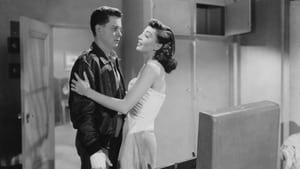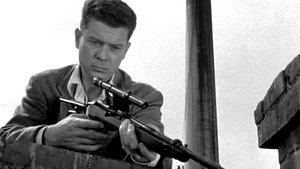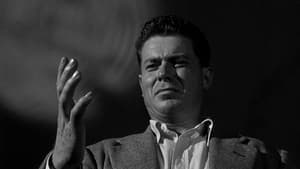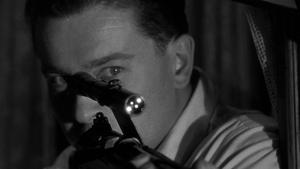Contact: [email protected]
Video Sources 0 Views
- Watch trailer
- The Sniper

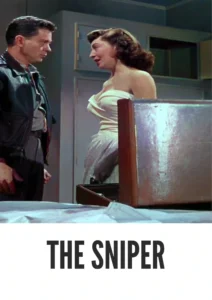
Synopsis
Table of Contents
ToggleReview: The Sniper (1952) – A Compelling Exploration of Psychological Turmoil

Introduction
The Sniper, released in 1952, stands as a gripping psychological thriller directed by Edward Dmytryk. This film delves into the depths of human psyche, offering a compelling exploration of isolation, obsession, and societal alienation. In this review, we’ll delve into the chilling narrative of The Sniper and its enduring impact on the portrayal of psychological turmoil in cinema.
Check The Full Colorized Movies List
Check Our Colorized Movies Trailer Channel
Understanding The Sniper (1952): Director, Cast, and Genre
Directed by Edward Dmytryk, The Sniper features a talented cast led by Arthur Franz and Marie Windsor. The film falls within the psychological thriller genre, known for its exploration of the human mind and the darker aspects of human nature.
Exploring the World of The Sniper (1952): Plot and Characters
The Sniper follows the story of Eddie Miller (Arthur Franz), a troubled war veteran who struggles with deep-seated psychological issues. Obsessed with a pathological need for intimacy and unable to form meaningful connections with others, Eddie embarks on a deadly killing spree, targeting women in the streets of San Francisco. As the police race against time to apprehend the elusive sniper, Eddie’s inner turmoil and fractured psyche come to the forefront, leading to a harrowing climax that explores the devastating consequences of unchecked mental illness.
The Art of Film Colorization
While The Sniper was originally filmed in black and white, its early colorized version adds a new layer of depth to its atmospheric storytelling and visual aesthetics. The colorization process enhances the film’s moody cinematography and captures the gritty urban landscape of San Francisco, immersing viewers in the chilling atmosphere of the narrative.
Early Colored Films: A Brief History
The history of early colored films is marked by innovation and experimentation as filmmakers sought to enhance the visual appeal of their movies. From hand-tinted frames to groundbreaking technicolor processes, the evolution of colorization techniques transformed the cinematic landscape, offering audiences a new way to experience their favorite films.
The Sniper (1952) and Its Early Colored Version
The decision to release The Sniper in a colorized format was met with anticipation and excitement. While some purists may prefer the original black and white version, the early colorized edition of the film adds a new dimension to its visual aesthetics and atmospheric storytelling, immersing viewers in the chilling world of a disturbed mind.
The Debate Over Film Colorization
The debate over film colorization continues to divide audiences and industry professionals alike. While some argue that colorization enhances the visual appeal of classic films and makes them more accessible to modern audiences, others maintain that it compromises the artistic integrity of the original work. As technology advances and filmmaking techniques evolve, the debate over colorization remains a topic of ongoing discussion within the film community.
Examining The Sniper (1952) as an Early Colored Film
Viewing The Sniper in its early colorized iteration offers audiences a fresh perspective on its atmospheric storytelling and visual aesthetics. The colorization process enhances the film’s moody cinematography and captures the gritty urban landscape of San Francisco, immersing viewers in the chilling atmosphere of the narrative. As Eddie’s descent into madness unfolds onscreen, the vibrant colors serve to underscore the intensity of his psychological turmoil and the haunting nature of his actions.
Influence and Legacy: The Sniper (1952)’s Impact on Cinema
The Sniper is widely regarded as a pioneering example of psychological thriller cinema, known for its exploration of mental illness and societal alienation. Its chilling portrayal of a disturbed mind has inspired countless filmmakers and influenced the depiction of psychological turmoil in popular culture. As a testament to its enduring relevance, The Sniper remains a haunting and thought-provoking cinematic experience that continues to captivate audiences around the world.
Director’s Cinematic Legacy: Beyond The Sniper (1952)
Edward Dmytryk’s directorial legacy extends far beyond The Sniper, encompassing a diverse body of work that spans multiple genres and styles. As a filmmaker, Dmytryk was known for his ability to create tension and suspense onscreen, as evidenced by his masterful direction of The Sniper. The film stands as a testament to his talent and creativity, solidifying his reputation as one of the great directors of his time.
Themes Explored in The Sniper (1952)
At its core, The Sniper explores themes of isolation, obsession, and societal alienation in the face of mental illness. Through its compelling narrative and nuanced characters, the film delves into the dark recesses of the human mind, offering a chilling examination of the devastating consequences of unchecked psychological turmoil. The Sniper serves as a haunting reminder of the fragility of the human psyche and the dangers of ignoring the signs of mental illness.
Reception and Controversy Surrounding The Sniper (1952)
Upon its release, The Sniper received widespread critical acclaim for its gripping narrative, atmospheric cinematography, and powerhouse performances. However, the decision to release the film in a colorized format sparked debate among fans and critics alike. While some praised the colorization process for enhancing the film’s visual appeal, others questioned its necessity and expressed concern about preserving the integrity of Dmytryk’s original vision.
Where to Watch The Sniper (1952) Online
For those eager to experience The Sniper for themselves, the film is readily available on popular streaming platforms such as Amazon Prime Video, Google Play Movies, and iTunes. Whether viewed in its original black and white format or its early colorized iteration, The Sniper offers a gripping and unforgettable cinematic experience that is sure to leave a lasting impression.
FAQs About The Sniper (1952)
1. Is The Sniper based on a true story?
The Sniper is a fictionalized portrayal of psychological turmoil and societal alienation. While the film’s characters and storyline are works of fiction, its exploration of mental illness draws inspiration from real-life experiences and psychological studies.
2. Who starred in The Sniper?
The Sniper stars Arthur Franz as Eddie Miller, the troubled war veteran grappling with psychological issues, and Marie Windsor as Lt. Anne Gilmore, the police officer tasked with apprehending him. Their captivating performances bring depth and authenticity to their respective roles, elevating the emotional resonance of the film.
3. What is the central conflict of The Sniper?
At its core, The Sniper revolves around the central conflict between inner turmoil and societal expectations. As Eddie Miller grapples with deep-seated psychological issues, he becomes embroiled in a deadly game of cat and mouse with the police, leading to a harrowing climax that explores the devastating consequences of unchecked mental illness.
4. Why was The Sniper released in a colorized format?
The decision to release The Sniper in a colorized format was made with the intention of enhancing the film’s visual appeal and immersing audiences in its atmospheric storytelling. While some purists may prefer the original black and white version, the early colorized edition of the film adds a new dimension to its visual aesthetics, enriching the viewer’s experience.
5. What is the legacy of The Sniper?
The Sniper is widely regarded as a pioneering example of psychological thriller cinema, known for its exploration of mental illness and societal alienation. Its chilling portrayal of a disturbed mind has inspired countless filmmakers and influenced the depiction of psychological turmoil in popular culture.
6. Are there any sequels or remakes of The Sniper?
No, there are no direct sequels or remakes of The Sniper. However, the film’s enduring legacy and timeless themes have left an indelible mark on the portrayal of psychological turmoil in cinema, inspiring countless imitators and influencing the way mental illness is depicted onscreen.
7. Where can I watch The Sniper online?
For those eager to experience The Sniper for themselves, the film is readily available on popular streaming platforms such as Amazon Prime Video, Google Play Movies, and iTunes. Whether viewed in its original black and white format or its early colorized iteration, The Sniper offers a gripping and unforgettable cinematic experience that is sure to leave a lasting impression.
Conclusion
In conclusion, The Sniper remains a haunting and psychologically intense thriller that continues to captivate audiences with its gripping narrative, atmospheric cinematography, and powerhouse performances. Whether viewed in its original black and white format or its early colorized iteration, Edward Dmytryk’s classic film offers a chilling exploration of isolation, obsession, and societal alienation in the face of mental illness. As viewers immerse themselves in the harrowing journey of Eddie Miller, they are reminded of the fragile nature of the human psyche and the devastating consequences of unchecked psychological turmoil.
